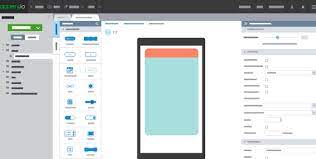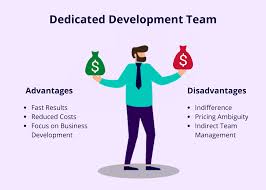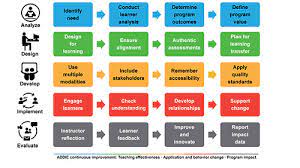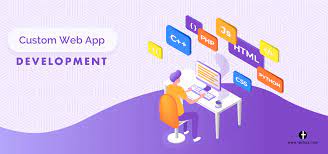App Making Software: Empowering Creativity and Innovation
In today’s technology-driven world, mobile applications have become an integral part of our lives. From ordering food to managing finances, there seems to be an app for everything. But have you ever wondered how these apps are created? The answer lies in app making software.
App making software is a powerful tool that empowers individuals and businesses to bring their app ideas to life without the need for extensive coding knowledge. It provides a user-friendly interface, enabling users to design, develop, and deploy mobile applications across various platforms such as iOS and Android.
One of the key advantages of app making software is its accessibility. Gone are the days when building an app required a team of developers working tirelessly for months. With app making software, anyone with a creative idea can transform it into a functional application within hours or days. This democratization of app development has opened up new opportunities for entrepreneurs, startups, and even hobbyists to turn their visions into reality.
Another benefit of using app making software is its cost-effectiveness. Traditional app development can be expensive, with hiring developers and investing in infrastructure adding up quickly. App making software eliminates these high costs by providing affordable subscription plans or one-time purchases, allowing users to save money while still creating professional-grade applications.
Furthermore, app making software often includes pre-built templates and drag-and-drop functionality that simplifies the development process. These features enable users to customize their apps by adding various elements such as buttons, images, forms, and navigation menus effortlessly. The intuitive nature of these tools ensures that even those without technical expertise can create visually appealing and user-friendly applications.
App making software also offers seamless integration with third-party services such as payment gateways, social media platforms, analytics tools, and more. This integration allows developers to enhance their apps with advanced functionalities without having to build them from scratch. By leveraging these ready-to-use integrations, developers can focus on refining their app’s core features and user experience.
Moreover, app making software often provides testing and debugging capabilities, allowing developers to identify and fix issues before launching their apps. This ensures a smoother user experience and reduces the chances of negative reviews or unsatisfied users.
However, it is important to note that while app making software offers convenience and flexibility, it may have limitations compared to custom-coded applications. Complex functionalities or unique requirements may require more advanced development techniques. In such cases, hiring professional developers or working with a dedicated app development agency might be necessary.
In conclusion, app making software has revolutionized the way mobile applications are created. It has empowered individuals and businesses to unleash their creativity and bring innovative ideas to life without extensive coding knowledge or large budgets. With its accessibility, cost-effectiveness, intuitive design tools, integration capabilities, and testing features, app making software has become an invaluable resource for anyone looking to enter the world of mobile app development. So why wait? Start exploring the possibilities today and turn your app idea into a reality with the help of app making software.
8 Frequently Asked Questions About App Making Software: Everything You Need to Know
- What is the best app making software?
- How much does app making software cost?
- What features do different app making software offer?
- How difficult is it to learn how to use app making software?
- Are there any free or open source app making software options available?
- What platforms can I use the app making software on?
- Are there any tutorials or guides to help me learn how to make an app with this software?
- Is there any customer support available for using the app making software?
What is the best app making software?
There are several app making software options available in the market, each with its own unique features and strengths. The “best” app making software ultimately depends on your specific needs, preferences, and level of expertise. Here are a few popular options to consider:
- Appy Pie: Known for its user-friendly interface, Appy Pie offers a drag-and-drop app builder that requires no coding knowledge. It supports various platforms and provides a wide range of templates and features.
- BuildFire: BuildFire is a robust app development platform that caters to both beginners and experienced developers. It offers customization options, pre-built templates, and integrates with popular third-party services.
- AppSheet: AppSheet stands out with its ability to convert existing spreadsheets into functional apps. It supports data-driven applications and provides advanced features like offline functionality and workflow automation.
- Thunkable: Thunkable is an intuitive platform that allows users to create cross-platform apps using a visual programming interface. It offers extensive customization options, including the ability to add complex logic to your app.
- GoodBarber: GoodBarber is known for its stunning design capabilities and offers various templates and customization options. It also provides advanced features like push notifications, geofencing, and e-commerce integration.
- Appery.io: Appery.io is a cloud-based platform that enables rapid development of mobile apps using visual builders or coding languages like HTML5 or JavaScript. It supports backend services integration and offers collaboration tools for team projects.
It’s important to thoroughly research each option, compare their features, pricing plans, customer support quality, user reviews, and consider your specific requirements before choosing the best app making software for your needs.
How much does app making software cost?
The cost of app making software can vary depending on several factors, including the features and functionalities offered, the platform compatibility (iOS, Android, or both), and the pricing model of the software provider. Here are some common pricing models you may encounter:
- Free: Some app making software providers offer free versions of their software with limited features or capabilities. These versions are often suitable for basic app development or for users who want to explore and familiarize themselves with the software before committing to a paid plan.
- Freemium: Many app making software providers follow a freemium model, where they offer a free version with basic features and limitations, while more advanced features are available through paid plans or subscriptions. The cost of these paid plans can range from a few dollars per month to several hundred dollars per year, depending on the provider and the level of functionality required.
- One-time purchase: Certain app making software may require a one-time purchase fee instead of recurring subscriptions. The price for such software can vary significantly depending on its complexity and capabilities. It is important to carefully evaluate your requirements and consider long-term needs before opting for a one-time purchase.
- Enterprise or custom pricing: For larger organizations or businesses with specific needs, some app making software providers offer enterprise or custom pricing plans. These plans are tailored to meet specific requirements and often include additional support, advanced features, or dedicated account managers. The cost for such plans is typically negotiated directly with the provider based on individual needs.
It is important to research different app making software options thoroughly to understand their pricing structures and compare them against your budget and project requirements. Keep in mind that while cost is an important factor, it should be balanced with other considerations such as ease of use, available features, customer support, and scalability in order to make an informed decision that aligns with your goals and resources.
What features do different app making software offer?
Different app making software offers a wide range of features to cater to various needs and skill levels. While the specific features may vary depending on the software, here are some common features you can expect:
- Drag-and-drop interface: Most app making software provides a visual interface that allows users to design their app by simply dragging and dropping elements onto the screen. This feature eliminates the need for coding and makes it easy for beginners to create their apps.
- Pre-built templates: Many app making software offers a selection of pre-designed templates that users can choose from. These templates serve as a starting point, providing a foundation for app layouts and designs.
- Customization options: App making software typically allows users to customize various aspects of their apps, such as colors, fonts, icons, and images. This feature enables users to create unique and visually appealing applications.
- App preview: To ensure that the app looks and functions as intended, most app making software provides a preview feature. Users can see how their app will appear on different devices before publishing it.
- Integration with third-party services: App making software often supports integration with popular third-party services like payment gateways, social media platforms, analytics tools, push notification services, and more. These integrations enhance the functionality of the app by enabling features like in-app purchases or social media sharing.
- Offline capabilities: Some app making software allows users to build apps that work offline by caching data locally on the user’s device. This feature is particularly useful for apps that need to function even when there is no internet connection available.
- Cross-platform development: Certain app making software supports cross-platform development, allowing users to create apps that work on multiple operating systems such as iOS and Android simultaneously. This saves time and effort by eliminating the need for separate development processes for each platform.
- Analytics and reporting: Many app making software includes built-in analytics tools that provide insights into app usage, user behavior, and performance metrics. These analytics help developers understand how users interact with their apps and make data-driven decisions for improvements.
- Push notifications: App making software may offer push notification capabilities, allowing developers to send targeted messages or updates to users even when the app is not actively in use. This feature helps engage users and keep them informed about important app-related information.
- App store publishing: To simplify the process of publishing an app to major app stores like the Apple App Store or Google Play Store, some app making software provides built-in publishing tools. These tools guide users through the submission process, ensuring compliance with store guidelines.
It’s important to note that the availability of these features may vary depending on the specific app making software you choose. It’s recommended to explore different options and compare their features before making a decision based on your specific requirements and goals.
How difficult is it to learn how to use app making software?
Learning how to use app making software can vary in difficulty depending on the specific software and your familiarity with technology. However, most app making software is designed to be user-friendly and intuitive, making it accessible to individuals with little to no coding experience.
App making software typically provides a visual interface with drag-and-drop functionality, allowing users to easily design and customize their app’s layout, features, and content. This eliminates the need for extensive coding knowledge and simplifies the development process.
Many app making software also offer tutorials, documentation, and online resources to guide users through the various features and functionalities. These resources can help you understand the software’s capabilities and provide step-by-step instructions on how to build your app.
While learning how to use app making software may not require coding expertise, having a basic understanding of concepts like user interface design, navigation flow, and mobile app best practices can be beneficial. Familiarity with technology and a willingness to explore different features will also make the learning process smoother.
It’s important to note that while app making software simplifies the development process, building a successful and polished app still requires thoughtful planning, creativity, and attention to detail. It’s recommended to spend time researching industry trends, studying successful apps in your niche, and understanding user expectations.
Overall, with patience, practice, and a willingness to learn, most individuals can become proficient in using app making software relatively quickly. It offers an accessible pathway for anyone interested in creating mobile applications without having extensive coding skills or experience.
Are there any free or open source app making software options available?
Yes, there are several free and open-source app making software options available. These tools provide a cost-effective solution for individuals and businesses who want to create mobile applications without any upfront expenses. Here are a few popular choices:
- MIT App Inventor: Developed by the Massachusetts Institute of Technology, MIT App Inventor is a free and user-friendly platform that allows you to create Android apps using a visual drag-and-drop interface. It provides a wide range of components and blocks to build functional applications without any coding knowledge.
- Flutter: Flutter is an open-source UI software development kit (SDK) developed by Google. It enables you to build native-quality iOS and Android apps from a single codebase. Flutter uses the Dart programming language and offers a rich set of pre-designed widgets, making it easier to create visually appealing and performant applications.
- PhoneGap: PhoneGap, also known as Apache Cordova, is an open-source mobile app development framework owned by Adobe. It allows developers to build cross-platform apps using web technologies such as HTML, CSS, and JavaScript. PhoneGap provides access to device features through plugins, enabling you to create apps with native-like functionality.
- React Native: React Native is an open-source framework developed by Facebook that allows you to build native iOS and Android apps using JavaScript and React. It provides a reusable component-based architecture, allowing developers to write code once and deploy it on multiple platforms.
- Appgyver: Appgyver offers a free version of their app development platform called Composer Pro. It provides a visual drag-and-drop interface for building mobile applications without coding. With Appgyver’s Composer Pro, you can create responsive apps with features like data integration, push notifications, and more.
These are just a few examples of the many free or open-source app making software options available in the market today. Each tool has its own unique features and capabilities, so it’s important to explore and choose the one that best suits your specific needs and requirements.
What platforms can I use the app making software on?
App making software is designed to be compatible with various platforms, allowing users to create applications for different operating systems. Here are some of the common platforms on which you can use app making software:
- iOS: App making software often supports iOS, allowing you to create applications specifically for Apple devices such as iPhones and iPads. These apps can be published on the Apple App Store.
- Android: Most app making software also supports Android, enabling you to develop applications for Android devices like smartphones and tablets. These apps can be published on the Google Play Store.
- Web: Some app making software offers the ability to create web applications that can be accessed through web browsers on desktops, laptops, and mobile devices. These apps do not require installation from an app store.
- Windows: Certain app making software provides support for developing applications for Windows-based devices such as PCs and tablets running on Windows operating systems.
- Cross-platform: Many app making software options allow you to build cross-platform applications, which means you can create a single application that works on multiple platforms simultaneously. This saves time and effort by avoiding the need to develop separate apps for each platform.
It’s important to note that the availability of platform support may vary depending on the specific app making software you choose. Before selecting a tool, it’s recommended to review its features and compatibility with your target platforms to ensure it meets your requirements.
By leveraging app making software compatible with multiple platforms, you can reach a wider audience and ensure your application is accessible across different devices and operating systems.
Are there any tutorials or guides to help me learn how to make an app with this software?
Absolutely! Most app making software providers understand the importance of providing tutorials and guides to help users get started. These resources are designed to assist beginners in learning the ins and outs of the software and guide them through the app development process. Here are some common types of tutorials and guides you can expect to find:
- Documentation: App making software typically provides comprehensive documentation that covers all aspects of using the software. This includes step-by-step instructions, explanations of various features, and troubleshooting tips. The documentation acts as a reference guide that you can consult whenever you have questions or need clarification.
- Video Tutorials: Many app making software providers offer video tutorials that walk you through the app development process visually. These tutorials often cover specific topics or features, allowing you to follow along and learn at your own pace. Video tutorials can be particularly helpful for visual learners who prefer watching demonstrations.
- Online Courses: Some app making software providers offer online courses or training programs that provide in-depth knowledge about using their software effectively. These courses may cover beginner, intermediate, and advanced topics, allowing you to progress at your own pace while gaining a deeper understanding of the app development process.
- Community Forums: Many app making software providers have active community forums where users can ask questions, seek advice, and share their experiences with fellow developers. Participating in these forums can be a great way to learn from others who have already gone through the learning curve and gain insights into best practices.
- Sample Projects: Some app making software providers offer sample projects or templates that users can explore and dissect to understand how different features work together. These sample projects serve as valuable learning resources by allowing you to see real-world examples and experiment with different functionalities.
When starting with a specific app making software, it’s advisable to visit their official website or support center to access these resources. Take advantage of the available tutorials, guides, videos, courses, and community forums to enhance your learning experience and build your app development skills. Remember, practice makes perfect, so don’t hesitate to dive in and start experimenting with the software to gain hands-on experience.
Is there any customer support available for using the app making software?
Yes, most reputable app making software providers offer customer support to assist users with any questions or issues they may encounter while using the software. Customer support can typically be accessed through various channels such as email, live chat, or phone.
The level of customer support provided may vary depending on the software provider and the specific plan or subscription you choose. Some providers offer 24/7 customer support, while others may have specific business hours. It’s important to review the support options and availability provided by the software provider before making a decision.
Customer support teams are usually knowledgeable about the software’s features and functionality and can guide users through troubleshooting steps or provide solutions to common problems. They can also assist with inquiries related to app publishing, integrations, and other technical aspects.
Additionally, many app making software providers also offer comprehensive documentation, tutorials, knowledge bases, and community forums where users can find answers to frequently asked questions or seek guidance from other users.
When considering an app making software provider, it’s beneficial to research their customer support reputation by reading reviews or testimonials from other users. This will give you an idea of their responsiveness and effectiveness in addressing user concerns.
Overall, having access to reliable customer support is crucial for a smooth app development experience. It ensures that users can receive timely assistance when needed and enhances their overall satisfaction with the app making software.




